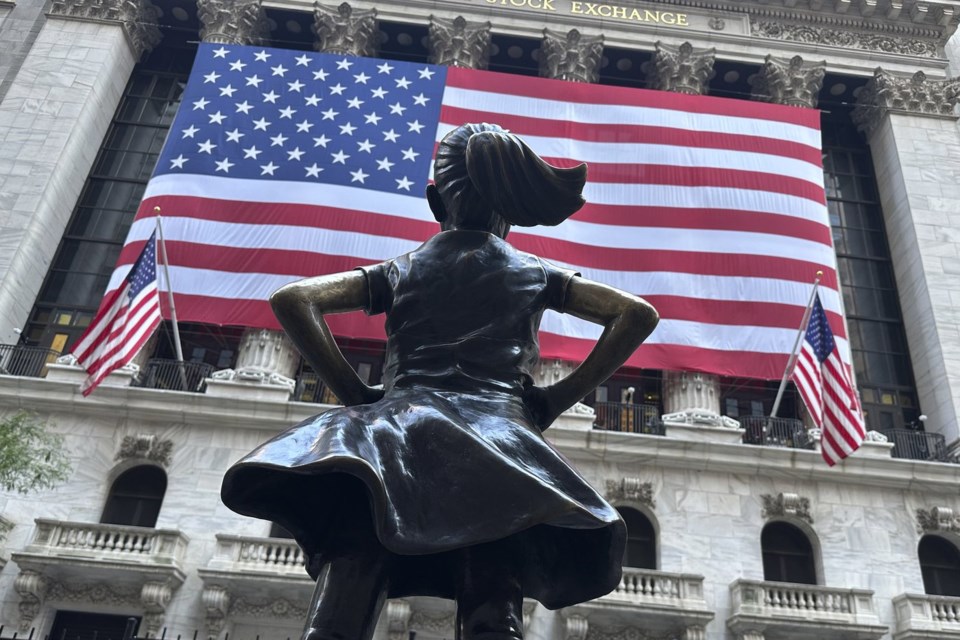NEW YORK (AP) — A zoom higher for Tesla helped drive Wall Street to more records. The S&P 500 rose 0.6% to top its all-time high set two weeks ago. The Dow Jones Industrial Average added 0.4%, and the Nasdaq composite climbed 0.8% from its own record set a day earlier. Tesla led the way after the electric-vehicle maker reported better sales for the spring than analysts feared. Treasury yields eased after the head of the Federal Reserve cited encouraging progress on inflation, which bolstered hopes for cuts to interest rates later this year. Crude oil’s price eased after touching its highest level since April.
THIS IS A BREAKING NEWS UPDATE. AP’s earlier story follows below.
NEW YORK (AP) — U.S. stocks are on track to set records on Tuesday in a quiet day on Wall Street.
The S&P 500 was 0.4% higher in afternoon trading, sitting above its all-time high set two weeks ago. The Dow Jones Industrial Average was up 107 points, or 0.3%, as of 2:36 p.m. Eastern time, and the Nasdaq composite was adding 0.7% to its record set a day earlier.
Tesla jumped 9.1% to help lead the market after the electric-vehicle maker reported a milder drop in sales for the spring than analysts expected.
But losses for some big, influential stocks were offseting that leap. Nvidia, which has become the poster child of the rush into artificial-intelligence technology, fell 1.4% and was the heaviest weight on the S&P 500. Eli Lily dropped 1.1% after President Joe Biden said in an opinion piece for USA Today that the company is charging “unconscionably high prices” for its treatment for weight loss and diabetes.
In the bond market, Treasury yields eased after investors took comments from the head of the Federal Reserve as a signal that it may deliver cuts to interest rates later this year. Fed Chair Jerome Powell, whose utterances are always finely parsed for hints about rates, gave a nod to improvements in inflation data after some disappointingly high readings early in the year.
“We just want to understand that the levels that we’re seeing are a true reading of underlying inflation,” he said.
The hope on Wall Street is that inflation will slow enough to get the Fed to pull down its main interest rate, which has been sitting at its highest level in more than two decades and pressing the brakes on the economy. Treasury yields have been easing since April on strengthening hopes for just that.
A report on Tuesday may have hindered those hopes, though. It showed U.S. employers were advertising more job openings at the end of May than economists expected and slightly more than April's tally. While plentiful job openings are great news for workers, the fear on Wall Street is that too strong of a job market will put upward pressure on inflation and force delays to rate cuts.
After swinging lower following Powell's comments, Treasury yields pared their losses following the report on job openings. The yield on the 10-year Treasury was sitting at 4.44%, compared with 4.46% late Monday.
Treasury yields have also been feeling some upward pressure because of politics recently. Last week’s debate between Biden and former President Donald Trump pushed traders to make moves in anticipation of a possible Republican sweep in November. That included sending Treasury yields higher, in part because of the possibility for policies that would further raise the U.S. government’s debt.
The 10-year yield is still well above its 4.29% level from late Thursday, before the debate.
In commodities markets, a barrel of benchmark U.S. crude oil fell 0.5% after earlier touching its highest price since April. Brent crude, the international standard, fell 0.3%.
Crude prices have been rising on expectations for strong demand during the summer, as well as the possibility of hurricanes damaging oil production in the Gulf of Mexico. Hurricane Beryl is roaring on a path that would take it near Jamaica and the Cayman Islands.
In stock markets abroad, European indexes fell after a report showed inflation in the region remains stuck above the level that the European Central Bank is hoping for. Germany’s DAX lost 0.7%, and France’s CAC 40 fell 0.3%.
A day earlier, French stocks had rallied after election results suggested a far-right political party may not win a decisive majority in the country’s legislative elections. That raised the possibility of gridlock in the French government, which would prevent a worst-case scenario where a far-right with a clear majority could push policies that would greatly increase the French government’s debt.
This is a big year for elections worldwide, with voters in the United Kingdom heading to the polls later this week
In Asia, Japan’s Nikkei 225 rose 1.1% after the value of the Japanese yen fell again to near another 38-year low. When the yen is weak, it can boost the fortunes of Japanese exporters.
___
AP Writers Matt Ott and Zimo Zhong contributed.
Stan Choe, The Associated Press




